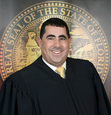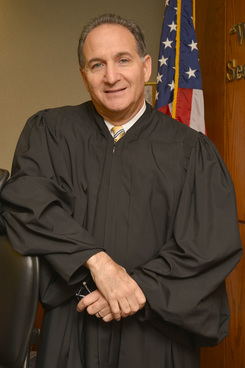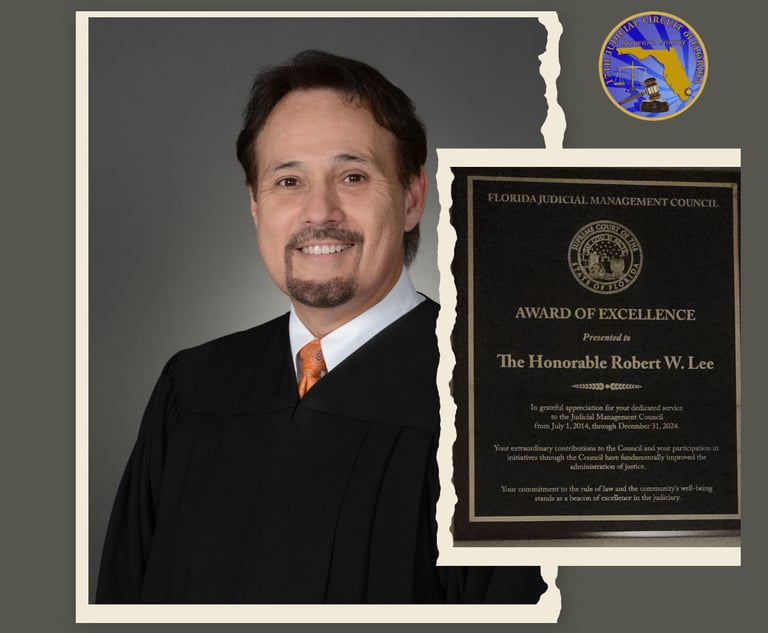Who Are the Best Judges in Miami-Dade, According to the Cuban-American Bar?
The association released its biennial assessment of its members' feelings on the state of the judiciary in advance of this month's primary election.
August 20, 2018 at 04:30 PM
6 minute read
 Jorge L. Piedra, managing partner with Piedra & Associates and president of the Cuban American Bar Association. Courtesy photo
Jorge L. Piedra, managing partner with Piedra & Associates and president of the Cuban American Bar Association. Courtesy photo
The Cuban American Bar Association's latest judicial poll shows which Miami-Dade jurists its members hold in high esteem.
The biennial survey of CABA members rates judges, magistrates and judicial candidates as “exceptionally qualified,” “qualified” or “unqualified.” It also gives members an option for “no opinion.” In addition to evaluating judges, the survey is also meant to gauge the confidence — or lack thereof — in the candidates running to join the bench, and measure how the courts treat Hispanics who appear before them.
See the full results of CABA's 2018 judicial poll:
According to the poll, Judges Barbara Areces, Antonio Arzola, Carlos Guzman, Peter R. Lopez, Lourdes Simon and Samantha Ruiz Cohen receive upward of 99 percent favorability ratings for their treatment of Hispanics in their courtroom.
Seventy-two percent of participants also found Lopez to be exceptionally qualified, while nearly 73 percent gave top scores to Miami-Dade Circuit Court Judge Miguel de la O.
On the other end of the spectrum was former Judge Stephen Millan, who was rated “unqualified” by nearly 55 percent of respondents. Millan stepped down from the bench in July amid allegations he directed racial slurs at black defendants who appeared in his courtroom.
 Miami Judge Resigns During Ethics Probe
Miami Judge Resigns During Ethics Probe
Jorge L. Piedra, managing partner with Piedra & Associates and president of the CABA, mentioned Lopez and Ruiz Cohen explicitly by name when speaking about the poll's findings.
“[They] received a 0 percent 'unqualified' return,” he said. “I've never seen that before in all the years I've looked at this poll. It's almost inconceivable that not even one person who responded felt that either of these two judges were not qualified.”
According to Piedra, this year's poll, which was the first to be conducted electronically, was largely a harbinger of good news.
“The poll goes into two sections: one, the qualifications of judges and two, their treatment of Hispanics,” Piedra explained. “The way the results are set up is to give anyone reading the poll a clear picture of how the respondents — who are all obviously lawyers — feel about a judge and their qualifications. We also tell the public the percentage of 'no opinion' returns for each judge … to give a clear indication as to whether or not there is a sufficient sampling to give anyone.”
Piedra also noted this year's poll reflected more positive sentiments among CABA members than usual.
“The returns were even better than they usually are: More than 30 percent of membership responded, if not more,” he said. “I think one of the most important takeaways from the poll this year is how the attorneys who are practicing in Miami-Dade courts feel that this is a very qualified judiciary. I look at the unqualified column — and when you see the overall numbers and how low they are — it tells you that our lawyers feel that we have a very qualified judiciary.”
Piedra was reluctant to comment on judges or judicial candidates that received less than exemplary marks from CABA members. He also would not disclose exactly how many respondents took the survey, saying only it was “more than a fair sample size.”
“I think the results speak for themselves and I am very confident that the results … reflect the views of the trial bar on the judiciary and of the candidates,” Piedra said. “I do think [the poll] reflects a better view of our judiciary than in past years.”
 Miami-Dade County Judge Steve Leifman. Photo: A.M. Holt
Miami-Dade County Judge Steve Leifman. Photo: A.M. HoltMiami-Dade County Court Judge Steve Leifman, who received high marks for both his qualifications and treatment of Hispanics, attributed his positive numbers to his initiatives concerning mental health.
“I don't have that many family members that are lawyers, so it was incredibly humbling to get that kind of rating by any bar association,” Leifman quipped. “We've been incredible successfully with reducing arrests with the program I helped develop in mental health treatment. People have been very appreciative of those results.”
Miami-Dade Circuit Judge Jeri Cohen told the Daily Business Review that she makes it a point not to look at judicial polls. About 32 percent of respondents rated her as exceptionally qualified, while about 54 percent found her qualified, and about 15 percent said she was unqualified. The rest expressed no opinion.
“I have been on the bench for 26 years, and I'm getting ready to retire in two years. At this stage in my career I know who I am, I know what I do for the community, and the bar polls are just not interesting to me,” Cohen said. “I do what I need to do to help people. My satisfaction comes from within.”
Likewise, judicial candidates Rosy Aponte and Elena Ortega-Tauler, both of whom are private practitioners, spoke to the Daily Business Review about the unfavorable ratings they received from CABA members opining on their qualifications for the bench.
“I respect the opinion of all of my colleagues. I believe that the seat that I am running for belongs to the people of Miami-Dade County,” Ortega-Tauler said. “Nonetheless when elected I hope to make all of my colleagues proud of me with my hard work.”
Ortega-Tauler is running for the County Group 40 seat.
Aponte meanwhile criticized the process used by CABA and its members to assess judicial qualifications, and called the sample size into question, saying it represented “a very small percentage of the people in this community.”
“All judicial candidates have passed the qualifications to be on the ballot, so by what measurement are the few people who took the poll deciding who is qualified or not? There were no variables as to why someone is qualified or not,” Aponte said. “So how accurate can it be?”
Related stories:
Rosy Aponte and Kristy Nunez Vying to Become Next Miami-Dade Judge
Miami-Dade Circuit Judge Jeri Cohen 'Tough' But 'Compassionate'
Leifman's Mental-Health Task Force Work Leads to Reform Bills
This content has been archived. It is available through our partners, LexisNexis® and Bloomberg Law.
To view this content, please continue to their sites.
Not a Lexis Subscriber?
Subscribe Now
Not a Bloomberg Law Subscriber?
Subscribe Now
NOT FOR REPRINT
© 2025 ALM Global, LLC, All Rights Reserved. Request academic re-use from www.copyright.com. All other uses, submit a request to [email protected]. For more information visit Asset & Logo Licensing.
You Might Like
View All
Sorry. We Can't Get to Your Case: Judge Speaks Out on Judicial Shortages

Trailblazing Broward Judge Retires; Legacy Includes Bush v. Gore

'Serious Disruptions'?: Federal Courts Brace for Government Shutdown Threat
3 minute read
5 Longtime Broward County Judges Set to Retire by End of 2024
Trending Stories
- 1Supreme Court Takes Up Challenge to ACA Task Force
- 2'Tragedy of Unspeakable Proportions:' Could Edison, DWP, Face Lawsuits Over LA Wildfires?
- 3Meta Pulls Plug on DEI Programs
- 4On the Move and After Hours: Meyner and Landis; Cooper Levenson; Ogletree Deakins; Saiber
- 5State Budget Proposal Includes More Money for Courts—for Now
Who Got The Work
Michael G. Bongiorno, Andrew Scott Dulberg and Elizabeth E. Driscoll from Wilmer Cutler Pickering Hale and Dorr have stepped in to represent Symbotic Inc., an A.I.-enabled technology platform that focuses on increasing supply chain efficiency, and other defendants in a pending shareholder derivative lawsuit. The case, filed Oct. 2 in Massachusetts District Court by the Brown Law Firm on behalf of Stephen Austen, accuses certain officers and directors of misleading investors in regard to Symbotic's potential for margin growth by failing to disclose that the company was not equipped to timely deploy its systems or manage expenses through project delays. The case, assigned to U.S. District Judge Nathaniel M. Gorton, is 1:24-cv-12522, Austen v. Cohen et al.
Who Got The Work
Edmund Polubinski and Marie Killmond of Davis Polk & Wardwell have entered appearances for data platform software development company MongoDB and other defendants in a pending shareholder derivative lawsuit. The action, filed Oct. 7 in New York Southern District Court by the Brown Law Firm, accuses the company's directors and/or officers of falsely expressing confidence in the company’s restructuring of its sales incentive plan and downplaying the severity of decreases in its upfront commitments. The case is 1:24-cv-07594, Roy v. Ittycheria et al.
Who Got The Work
Amy O. Bruchs and Kurt F. Ellison of Michael Best & Friedrich have entered appearances for Epic Systems Corp. in a pending employment discrimination lawsuit. The suit was filed Sept. 7 in Wisconsin Western District Court by Levine Eisberner LLC and Siri & Glimstad on behalf of a project manager who claims that he was wrongfully terminated after applying for a religious exemption to the defendant's COVID-19 vaccine mandate. The case, assigned to U.S. Magistrate Judge Anita Marie Boor, is 3:24-cv-00630, Secker, Nathan v. Epic Systems Corporation.
Who Got The Work
David X. Sullivan, Thomas J. Finn and Gregory A. Hall from McCarter & English have entered appearances for Sunrun Installation Services in a pending civil rights lawsuit. The complaint was filed Sept. 4 in Connecticut District Court by attorney Robert M. Berke on behalf of former employee George Edward Steins, who was arrested and charged with employing an unregistered home improvement salesperson. The complaint alleges that had Sunrun informed the Connecticut Department of Consumer Protection that the plaintiff's employment had ended in 2017 and that he no longer held Sunrun's home improvement contractor license, he would not have been hit with charges, which were dismissed in May 2024. The case, assigned to U.S. District Judge Jeffrey A. Meyer, is 3:24-cv-01423, Steins v. Sunrun, Inc. et al.
Who Got The Work
Greenberg Traurig shareholder Joshua L. Raskin has entered an appearance for boohoo.com UK Ltd. in a pending patent infringement lawsuit. The suit, filed Sept. 3 in Texas Eastern District Court by Rozier Hardt McDonough on behalf of Alto Dynamics, asserts five patents related to an online shopping platform. The case, assigned to U.S. District Judge Rodney Gilstrap, is 2:24-cv-00719, Alto Dynamics, LLC v. boohoo.com UK Limited.
Featured Firms
Law Offices of Gary Martin Hays & Associates, P.C.
(470) 294-1674
Law Offices of Mark E. Salomone
(857) 444-6468
Smith & Hassler
(713) 739-1250






